
Women in Sports in the Middle East: Breaking Barriers and Redefining the Game
For centuries, women in the Middle East faced significant cultural and societal barriers when it came to participating in sports. From limited access to facilities to deeply ingrained gender norms, the path for female athletes has been anything but easy. However, the narrative is changing. Across the region, women are stepping into arenas, breaking records, and inspiring generations. With initiatives like Saudi Arabia’s Vision 2030 and organisations such as WiMENA (Women in Middle East and North Africa), women’s sports are experiencing a renaissance that is reshaping not only the sports landscape but also societal perceptions of gender roles. If you are in London in May – don’t miss this conference dedicated entirely to women and sports
This post explores the rise of women in sports across the Middle East, highlighting key milestones, challenges, and opportunities that are paving the way for a more inclusive future.
The Cultural Shift: A New Era for Women’s Sports
Historically, women’s participation in sports in the Middle East was constrained by cultural norms and societal expectations. In countries like Saudi Arabia, physical education for girls was not introduced in schools until 2017. Public spaces for women to engage in sports were scarce, and attending sporting events as spectators was largely prohibited until 2018.
The turning point came with progressive reforms driven by governments across the region. Saudi Arabia’s Vision 2030, for example, explicitly focuses on increasing female participation in all aspects of society, including sports. The introduction of policies promoting gender equality has led to a surge in opportunities for women to engage in athletics—from grassroots programs to elite competitions.
One of the most significant cultural shifts has been framing sports as harmonious with Islamic values. By emphasising health benefits and community-building governments and organisations have successfully reshaped societal attitudes toward women in sports.
Milestones in Women’s Sports Across the Region
Saudi Arabia: From Exclusion to Empowerment
Saudi Arabia has made remarkable strides in empowering women through sports over the past decade:
- In 2012, Saudi women participated in the Olympics for the first time.
- The establishment of a dedicated Women’s Football Department within the Saudi Arabian Football Federation (SAFF) has led to exponential growth in female football participation. The Saudi Women’s Premier League launched in 2020, followed by a national team that achieved FIFA recognition in 2023.
- Grassroots programs like the Schools League have engaged over 77,000 girls annually, while six regional training centres provide pathways for young athletes to develop their skills.
- Female athletes are excelling across disciplines such as track and field (Yasmeen Al-Dabbagh), boxing (Rasha Al-Khamis), and motorsport (Reema Juffali).
Kuwait: Leadership Development
In Kuwait, initiatives like The Safeguarding Alliance’s Women in Sport Leadership Program are empowering women to take on leadership roles within sports organisations. This program provides mentorship and training for female coaches, referees, and administrators while fostering a safe and inclusive environment for participants.
United Arab Emirates: A Hub for International Competitions
The UAE has positioned itself as a global hub for women’s sports by hosting events such as the Arab Women Sports Tournament and international tennis championships. The country is also investing heavily in esports and tech-driven sports initiatives that appeal to younger generations of female athletes.
The UAE Women’s Tour has become one of the region’s most prominent sporting events, earning international recognition for its impact on women’s cycling. Organised by the Abu Dhabi Sports Council and listed on the Union Cycliste Internationale (UCI) calendar, this road cycling race attracts elite athletes from around the world. In February 2025, the third edition of the UAE Women’s Tour featured four diverse stages across Abu Dhabi, Dubai, Al Ain, and Al Dhafra regions.
Qatar: New Ways for Inclusivity
Qatar is making remarkable strides in empowering women in sports, breaking down cultural barriers and fostering a new generation of female athletes. Through initiatives like Qatar Foundation’s “Creating Pathways” program and the Qatar Olympic Committee’s (QOC) gender equality efforts, the country is setting a strong precedent for inclusivity in athletics. “Creating Pathways” provide structured training in sports like track and field, volleyball, and fencing, offering young girls access to high-quality coaching, mentorship, and holistic development. The upcoming women’s sports stadium in Education City, set to open by 2027, symbolises Qatar’s commitment to providing dedicated spaces for female athletes to train and compete at the highest levels.
Additionally, initiatives like the “Cycle Her Way” program have seen unprecedented success, with hundreds of women participating in cycling races and training sessions aimed at building a national women’s cycling team. Female athletes like Jawaher Al Nasr in football and Lolwa Al Jassim in cycling are becoming role models, inspiring young girls to pursue sports despite societal challenges. Qatar’s focus on creating safe spaces, increasing media visibility for female athletes, and establishing professional leagues underscores its dedication to gender equity in sports. As Qatar continues to host major international events like the FIFA World Cup and the upcoming 2030 Asian Games, it is clear that women’s sports will play a pivotal role in shaping the nation’s athletic future.
WiMENA: Driving Change Through Collaboration
WiMENA (Women in Middle East and North Africa) is at the forefront of efforts to elevate women’s participation in sports across the region. Through conferences, workshops, and partnerships with global organisations like Formula E and FIFA, WiMENA aims to break down cultural barriers while showcasing women’s leadership potential. Don’t miss the event on 29th May in London – a line up of incredible speakers.
In February 2025, WiMENA hosted two transformative conferences in Saudi Arabia—one in Jeddah focusing on motorsport and another in Riyadh covering grassroots development, leadership pathways, and technology integration within sports. These events brought together business leaders, athletes, policymakers, and industry stakeholders to discuss strategies for fostering inclusivity and creating sustainable opportunities for women in sports. WiMENA’s mission extends beyond competition; it seeks to inspire change at every level—from providing young girls with access to facilities to equipping female leaders with tools to drive systemic change.
Challenges Facing Women Athletes
Despite progress, significant challenges remain:
- Cultural Resistance: In many parts of the region, traditional views still discourage women from participating in physical activities or pursuing careers in sports.
- Limited Infrastructure: Access to affordable facilities remains a barrier for many aspiring athletes.
- Media Representation: Female athletes often lack visibility compared to their male counterparts, making it harder for them to secure sponsorships or serve as role models.
- Workforce Development: There is a shortage of trained female coaches, referees, and administrators needed to support growing demand.
The Role of Vision 2030
Saudi Arabia’s Vision 2030 has been instrumental in addressing these challenges by prioritising investment in infrastructure, education programs, and international partnerships aimed at empowering women through sports:
- Massive investments have been made to build state-of-the-art facilities accessible to both men and women.
- Programs like “Move To Game” encourage physical activity among women while promoting healthier lifestyles.
- International collaborations have brought expertise from around the world into local training programs.
These efforts have not only increased participation but also inspired broader societal change by normalising female involvement in traditionally male-dominated spaces.
More Inspiring Stories: Women Breaking Barriers
Safiya Al Sayegh: A Cycling Pioneer
Safiya Al Sayegh made history as the first Emirati female cyclist to qualify for the Olympics, representing her nation at Paris 2024 in road races. Her groundbreaking achievements have inspired a new generation of female cyclists in the UAE while showcasing her resilience and dedication to breaking barriers.
Fatima Ali Hassan Al Blushi: Sprinting Toward Glory
Specialising in 100- and 200-meter sprints, Fatima Ali Hassan Al Blushi holds national records for both distances as part of Sharjah Women’s Sports Club. Her disciplined training regimen and international success reflect her commitment to excellence while balancing professional responsibilities.
The Future of Women’s Sports in the Middle East
The future looks bright for women’s sports across the Middle East:
- Increased funding from both public sectors (e.g., government initiatives) and private sectors (e.g., sponsorship deals) ensures sustainability.
- Grassroots programs targeting young girls will continue nurturing talent pipelines.
- International events hosted within MENA countries will further spotlight regional achievements while encouraging cross-cultural collaboration.
As more doors open for female athletes—whether through policy reforms or groundbreaking initiatives like WiMENA—the region is poised not only to catch up with global standards but also set new benchmarks for inclusivity within sports.
The rise of women’s sports in the Middle East is more than just a movement—it is a revolution redefining gender roles while celebrating resilience against adversity. From grassroots efforts empowering young girls to elite competitions showcasing world-class talent—the progress made thus far serves as both inspiration and a call-to-action.
As we look ahead toward continued growth fuelled by initiatives like Vision 2030—it becomes clear that this journey isn’t just about winning medals—it’s about breaking barriers shaping societies—and ultimately inspiring future generations who dare dream big.
Finally there is a lot of opportunity to get involved as a company to help these visions come to life. So don’t miss mingling with trailblazers, inspirational panels and gaining new insights. See you on 29th May.

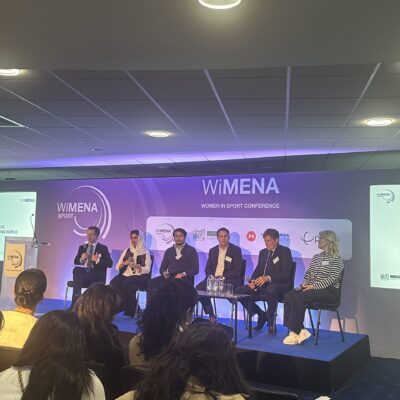
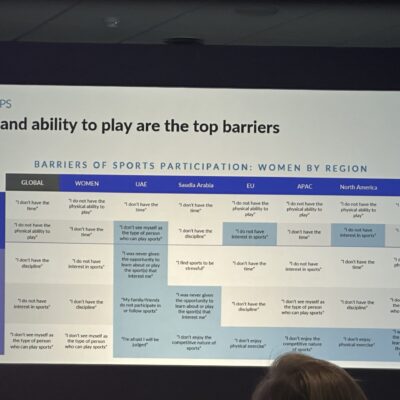
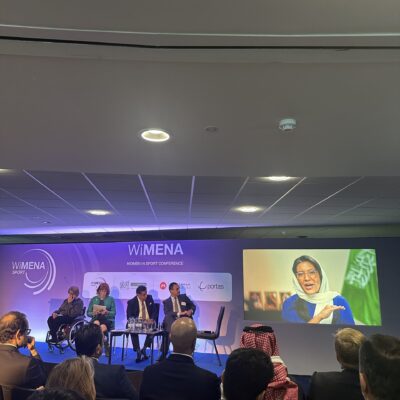
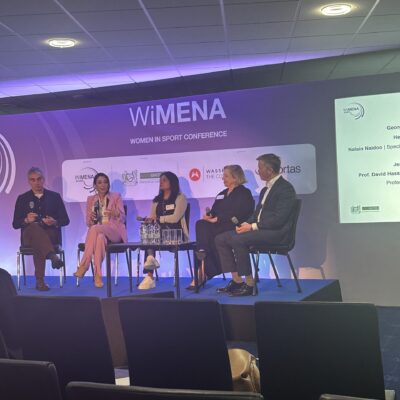
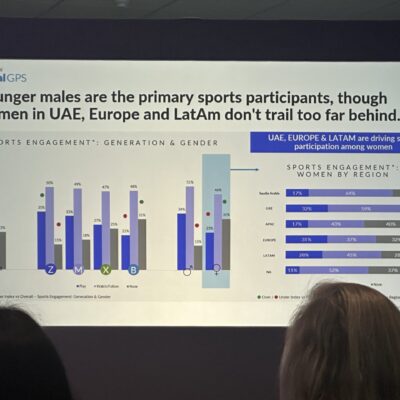
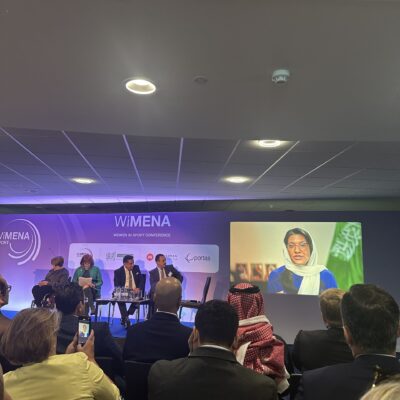
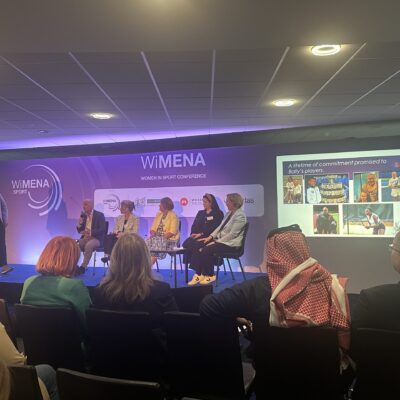



This Post Has 0 Comments